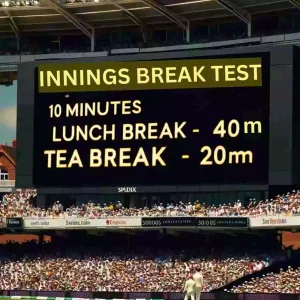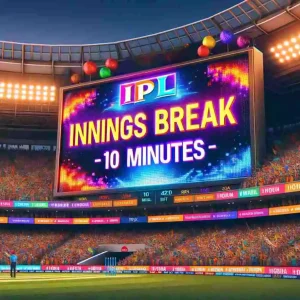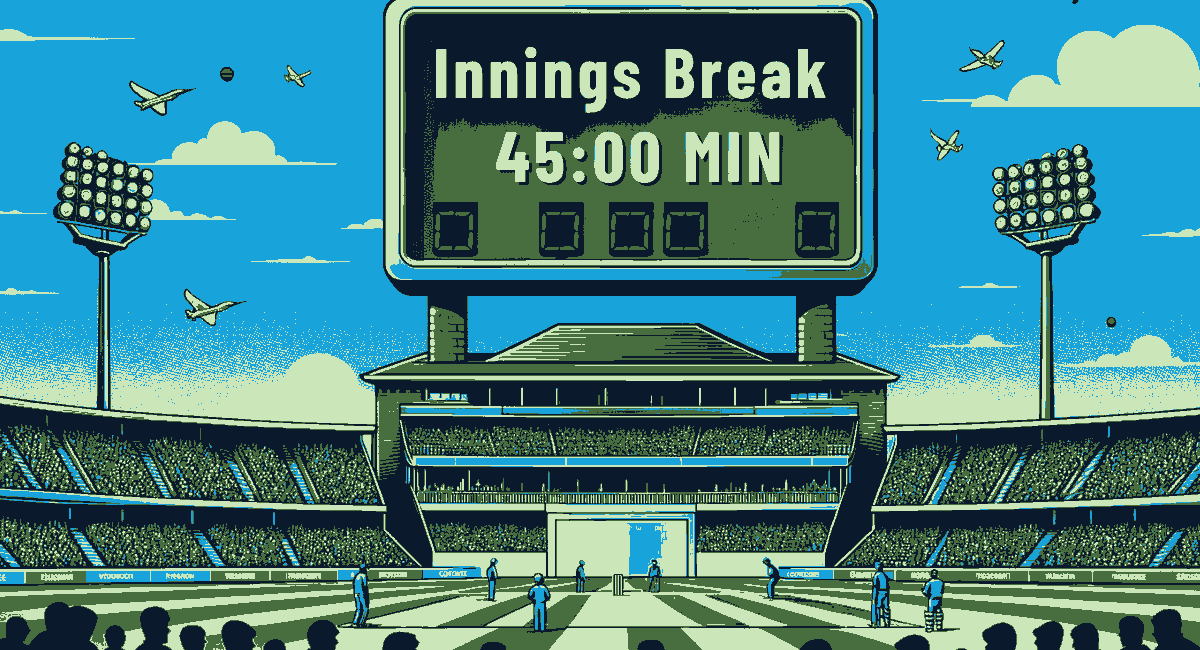In cricket, the innings break is a crucial part of the game’s rhythm. It’s the time between innings when teams switch roles from batting to fielding or vice versa. This break allows players to rest, strategize, and prepare plan and tactics for the next phase of the match. The duration of the innings break varies across different formats of cricket, including One Day Internationals (ODIs), Test matches, Twenty20 Internationals (T20Is), and the India Premier League (I.P.L.).
Each cricket format has distinct rules and traditions, which are reflected in the innings break durations. These breaks are designed to suit the length and style of each format, ensuring a balance between rest and entertainment value for spectators.
For example, T20 games have a shorter duration compared to Test and ODI cricket, so the time gap between two innings is shorter in T20s and longer in the other formats. In the following sections, we will explore the innings break times in ODIs, Test matches, T20Is, and the I.P.L.
In a One Day International cricket match, the innings break typically lasts for 45 minutes. However, this duration can be adjusted under certain circumstances.
If the first innings consumes more time than expected, the umpires have the discretion to shorten the break.
Additionally, if the first innings concludes close to the scheduled lunchtime, the break can be taken immediately.
| Time Lost in First Innings | Adjusted Break Duration |
|---|---|
| Up to 60 minutes | 30 minutes |
| Up to 120 minutes | 20 minutes |
| More than 120 minuv btes | 10 minutes |
| First innings ends near scheduled lunchtime | Break taken immediately |

In Test cricket, the innings break is quite brief compared to ODIs. According to MCC’s Law 11.2.2, the interval between innings in a Test match is set at 10 minutes. This short duration is consistent with the traditional structure of Test cricket, which also includes longer breaks for lunch (40 minutes) and tea (20 minutes).
| Event Timing Relative to Scheduled Break | Resulting Break Duration |
|---|---|
| 10 minutes or less before lunch | 40-minute lunch break |
| 30 minutes or less before tea | 20-minute tea break |
| Less than 10 minutes remaining in the day’s play | Play concludes for the day; next innings starts the following day |
The innings break in T20 cricket, including T20 Internationals (T20Is) and the India Premier League (I.P.L.), is only 10 minutes long. This brief break is designed to keep the overall duration of a T20 match within approximately three hours.
T20 cricket includes in-match penalties for slow over rates. If a fielding side is not in position to bowl the first ball of the final over by the scheduled end time of the innings, they are penalized by allowing one fewer fielder outside the 30-yard circle for the remaining overs. This rule is captured in clause 13.8 of the playing conditions.
Besides in-match penalties, there are additional sanctions outlined in Article 2.22 of the Code of Conduct for slow over rates. Furthermore, bowling teams in T20 cricket must complete their 20 overs within 75 minutes. If they fail to do so, a bonus of six runs is awarded to the batting team. Additionally, umpires may impose five-run penalties if they feel a team is needlessly wasting time, all aimed at maintaining the rhythm and pace of the game.
| Cricket Format | Time Limit for Bowling Team | Consequence of Not Meeting Time Limit |
|---|---|---|
| T20 Cricket | 20 overs within 75 minutes | Bonus of 6 runs awarded to batting team |
| General Rule | – | Umpires may impose a 5-run penalty for needless time wasting |

In the I.P.L., each inning is designed to last around one and a half hours. The official innings break in the I.P.L. is 10 minutes long. This short break is consistent with the fast-paced nature of T20 cricket, ensuring the overall match duration is kept within approximately three hours. During this break, the batting side can take an optional drink break of two minutes and 30 seconds.
According to Clause 12.7 of the I.P.L. Playing Conditions, a team must complete 14.11 overs per hour. Specifically, the 20th over should finish within 90 minutes of the start of the innings (including 85 minutes of playing time plus a 5-minute time-out).
If a team fails to adhere to these time stipulations, they face several penalties. The first offence resulted in the captain being fined INR 12 lakh. For a second offence, the fine is doubled, and the other team members are penalized INR 6 lakh or 25% of their match fee, whichever is less. Additionally, the fielding team loses the privilege of having an extra fielder outside the 30-yard circle if they violate these over-rate conditions.
Fantasy Sports are Legal in India
In ODI cricket, there are usually two drinks breaks per innings. Each drinks break lasts for about 5 minutes.
In One Day International (ODI) cricket, the innings break typically lasts for up to 45 minutes. This break allows teams and players to switch roles from batting to fielding or vice versa. However, the duration of this break can be adjusted depending on how the match is progressing.
For instance, if there is a delay in the first innings, the umpires might reduce the break time to compensate.
This flexibility ensures that the match finishes on time.
An ODI cricket match usually lasts between 7.5 and 8 hours. The match is played over a single day and comprises two innings, with each team batting for a maximum of 50 overs.
The typical breakdown of time in an ODI includes 3 hours and 20 minutes for the first innings, a break of 40-45 minutes, followed by another 3 hours and 20 minutes for the second innings.
The duration of an over in cricket can vary from 3 to 6 minutes on average. This variation depends on the type of bowler bowling the over.
For instance, a fast bowler, who needs a longer run-up, will take more time to complete an over compared to a spin bowler.
Some bowlers are known for their speed in completing an over. R. Jadeja of India finishes an over in 2 minutes. However, Pakistani bowler Y. Khan bowled 5.2 overs in 8 minutes, with one over taking only 35 seconds in domestic competition.
Current rules suggest a bowling team should finish 13-15 overs in an hour, but this rate may vary based on the game type.
The India Premier League has a brief strategic timeouts of 2.5 minutes, designed to take a breather and decide furthers tactics, plan and approach of the game. During this short time, teams regroup while fans can quickly refresh themselves, eagerly anticipating the next phase of play.
There are 2 innings in an ODI, one innings per team. Both teams can play upto 50 overs. One teams who bats first set up the target for another and the other team will get only 1 change or 1 innings to chase the target.
Innings breaks during the T20 World Cup last for 10 minutes. This quick break is set to ensure the fast-paced nature of the T20 format is kept, allowing players a rapid switch from fielding to batting, or vice versa.
One-Day Internationals feature a 45-minute innings break, providing teams with enough time to recover and strategize for the upcoming innings. It’s also a perfect interval for fans to discuss the game’s progress and check on their fantasy teams on platforms like Gamesys11.
An ODI match consists of total 7 hours in which each team has to complete the overs within 3.5 hours i.e 3 hours and 30 minutes. If they failed to do so several penalty and fines can be raised against the captain.
Test cricket matches have an innings break of approximately 10 minutes unless the end of an innings coincides with a scheduled lunch or tea break. These breaks are essential for players to prepare for their next roles in the match.
No, it doesn’t differ. In World Cup matches following the ODI format, the break between innings is typically 45 minutes. However, this can be shortened if there are unexpected delays to ensure the game completes in a reasonable time.
Yes, in Test cricket, the standard 10-minute innings break can be adjusted if the innings ends close to a scheduled lunch, tea, or the end of a day’s play, which might result in a longer pause before the action resumes.

